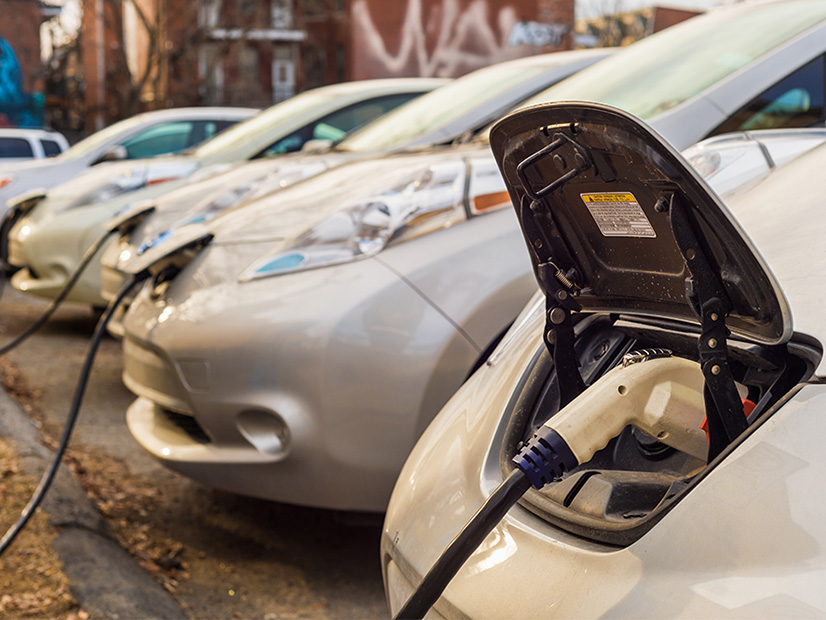Gov. Phil Murphy said Monday he has started New Jersey’s adoption of California’s Advanced Clean Cars II (ACCII) rules, filing a proposal with the state Office of Administrative Law that would require electric vehicle manufacturers to increase light-duty EV sales until they account for all new sales in the state by 2035.
The office is expected to publish the proposal in the New Jersey Register on Aug. 21, triggering a public comment period that will run through Oct. 20, 2023.
Murphy announced the plan in February, prompting environmentalists to urge the rules be enacted by the end of the year, ready for the 2027 car sales year.
As adopted by California last August, ACC II requires car manufacturers to provide an increasing percentage of zero-emission vehicles (ZEVs) for sale each year. It defines zero-emission vehicles as battery-electric, hydrogen fuel cell or plug-in hybrid. (See Calif. Adopts Rule Banning Gas-powered Car Sales in 2035.)
The regulation starts with a 35% ZEV sales requirement for model year 2026, increasing to 68% in 2030 and reaching 100% in 2035.
ACC II also includes increasingly stringent low-emissions vehicle standards aimed at reducing tailpipe emissions of gasoline-powered cars and heavier passenger trucks.
“Our commitment to bringing the ACCII proposal to fruition is a commitment to every New Jersey family and the air they breathe,” Murphy said in a statement.
Transportation, accounting for 42% of the carbon emissions in New Jersey, is the state’s largest source of emissions.
Murphy’s announcement was welcomed by environmental groups, but the New Jersey Business and Industry Association (NJBIA) and the New Jersey Coalition of Automotive Retailers (NJCAR) criticized the plan, saying the state is not ready for such a fast uptake of EVs. (See Enviros Demand NJ Move Faster on 100% EV Rule.)
‘Impossible’ Task
Ray Cantor, deputy chief government affairs officer for the NJBIA, said implementing (ACC II) “is likely to result in a major increase in New Jersey residents who actually won’t be able to afford to drive.”
With EVs accounting for about 7% of vehicle sales, jumping to 43% when the rules kick in during the 2027 vehicle year is unfeasible, Cantor said.
“We do know that EV sales will increase. However, such a steep ramp-up in electric-only vehicles over 12 years in New Jersey seems impractical, if not impossible, when you consider the lack of charging infrastructure and planning for it,” Cantor said. He added that “such a policy also begs the obvious question of where all this increased electricity will be sourced from.”
If manufacturers fail to meet the mandated targets, “it’s likely there will be a sizable penalty or surcharge imposed on the buyer of every non-EV car sold,” he said. “This mandate will actually drive up the cost of all cars in New Jersey, new and used, by thousands of dollars.”
Jim Appleton, president of NJCAR, said his members have nothing against selling EVs, but “consumer interest in EVs is nowhere near the levels mandated by the California architects of ACC II.”
“New Jersey is not California,” he said. “Rising new and used vehicle prices are a major driver of inflation and adopting this policy will be like throwing fuel on the fire. By taking away ICE [internal combustion engine] vehicle options for New Jersey consumers, this policy will lead automakers to send only their most expensive and profitable ICE vehicles here, in order to push reluctant buyers to more expensive EVs that may not meet their individual needs.”
Consumer Demand
New Jersey’s Energy Master Plan calls for the state to deploy 330,000 light-duty EVs by 2025. Modeling by the International Council on Clean Transportation projects that New Jersey will have 7.5 million EVs on the road by 2050 if the ACC II rules are enacted, and just 1.3 million if it isn’t.
The state in December had 91,569 EVs on the road, accounting for 1.42% of the state’s light-duty vehicles, according to Atlas Public Policy, a research company. On July 12, the BPU announced the launch of the fourth year of the Charge Up New Jersey incentive program, which offers up to $4,000 for EVs priced below $45,000 and up to $1,500 for vehicles priced between $45,001 and $55,000.
Washington, Oregon, New York, Massachusetts, Virginia and Vermont already have adopted the California ACC II program and Colorado, Maryland, Delaware and Rhode Island are considering it. New Mexico Gov. Michelle Lujan Grisham announced earlier this month that the state would increase its clean vehicle sales to 82% by 2032. (See NM Sets Course to Adopt New Clean Vehicle Rules.)
In New Jersey, environmentalists welcomed Murphy’s advance of the rules. Anjuli Ramos-Busot, New Jersey Director of the Sierra Club, called it “one of the most important policies for New Jersey to adopt.”
“The EV market is already here, the manufacturers are committed and the public wants the options,” she said in a statement included with Murphy’s announcement.
In contrast to Cantor’s prediction, Allison McLeod, public policy director at the New Jersey League of Conservation Voters, said the rules would make EVs more accessible to drivers.
“Since the majority of New Jerseyans — particularly low-income drivers — purchase used vehicles, it will also help with the purchase of affordable vehicles in the secondary market,” she said.

